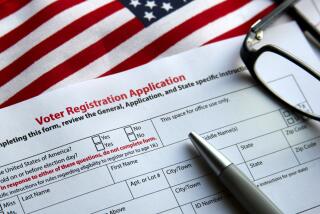Croatian Serbs Denied Right to Vote in Homeland : Balkans: Government allows Bosnian Croats living outside country to cast ballots. But Krajina refugees forced from nation cannot take part.
- Share via
ZAGREB, Croatia — If you are a Croat living in Southern California or, more importantly, Bosnia-Herzegovina, you can vote in Croatia’s parliamentary elections today.
If you are a Croatian Serb driven from your ancestral Croatian home 12 weeks ago by a government military offensive, you will not be voting.
The government of President Franjo Tudjman hastily rewrote the electoral law last month to give unprecedented voting rights to Croats who reside permanently outside Croatia. Croatian Serbs, however, need not apply.
Who can vote and who cannot are only two of the issues that cloud today’s balloting for 128 legislators as Croatia seeks to cast itself as an evolving Western democracy emerging from brutal ethnic warfare.
International monitors and other critics point to several irregularities and deficiencies in the system--including government control over access to media and the elimination of parliamentary seats reserved for minorities--that raise serious questions about fairness and will ultimately strengthen Tudjman’s hold on power and push his government to the right.
Tudjman, a strident nationalist leader who has become Washington’s favorite ally in the Balkans, is not up for reelection. But his picture dominates the billboard landscape all over the country, urging citizens to vote for “The right man and the right party--at the right time” and pledging to use force if necessary to recapture all Croatian territory lost to Serbs in a 1991 war.
In the run-up to today’s vote, the biggest controversy has been generated by the new electoral law. It will allow 310,000 Bosnian Croats to cast ballots for legislators who will represent them not in Bosnia, their home country, but here in Croatia. Most Croats in Bosnia are seen as hard-line supporters of Tudjman’s nationalist party.
Critics charge that the inclusion of Bosnian Croats in a Croatian election challenges the sovereignty of Bosnia and is one more step in Zagreb’s attempt to annex western Bosnia. The Bosnian Croats are being given yet another reason to pledge loyalty to the government in Zagreb, the Croatian capital, and not in Sarajevo, the Bosnian capital.
“It’s a symbol to show [that the Bosnian Croats] are part of Croatia,” said Zarko Puhovski, a professor of political philosophy at Zagreb University. “Giving them the vote is a first step to a Greater Croatia.”
Analysts and diplomats said broadened voting rights for Bosnian Croats also threaten a U.S.-sponsored peace initiative for the Balkans because the issue aggravates relations between Croatia and Bosnia. They also expressed concern that the electoral changes will further weaken the Muslim-Croat federation, the government entity in Bosnia that will retain control of roughly half of Bosnia in any eventual peace settlement. U.S. officials consider the federation, made up of Bosnian Croats and Muslims, crucial to the success of any peace plan, but it is a shaky alliance.
The Muslim-led Bosnian government protested the decision to allow Bosnian Croats to vote in Croatia’s election, saying it represents a “Trojan horse” of Croatian influence in Bosnia. For today’s vote, the Croatian government is setting up 96 polling stations in 39 Bosnian towns, the majority in the southwestern town of Mostar and similar Bosnian Croat strongholds.
“It undermines the whole concept of sovereignty for Bosnia, for the federation, and it [strains] relations between Bosnia and Croatia,” said a Western diplomat in Zagreb.
“If one were being kind, you might say [the Croatian government] is relieving tension . . . by bringing the Bosnian Croats in. If one were not being kind, you would see this as a highly provocative action and the start of Croatia’s partitioning of Bosnia.”
Ten percent of the seats in the new legislative body will be reserved for the diaspora--Croats living abroad. The slate of ruling party candidates for these seats is dominated by Bosnian Croats and includes the Croatian ambassador to Bosnia.
At the same time, electoral laws will effectively exclude an estimated 180,000 Croatian Serbs whose families have lived in Croatia for centuries but who fled a government army advance on their mutinous Krajina region in early August.
*
Most now languish as refugees in Serbia, where not a single polling station will be set up because Croatia does not recognize Serbia. Moreover, the majority of Krajina Serbs fled their homes so quickly they do not have the documents they would need to vote.
“There are many Croats who have never been in Croatia, who certainly have never lived in Croatia, and whose parents and grandparents and great-grandparents have never lived in Croatia--they can vote,” said Leslie Campbell, field representative of the U.S.-financed National Democratic Institute for International Affairs, which is observing the election.
“Yet Serbs who are citizens of Croatia . . . cannot vote.”
International monitors also criticized the government decision to reduce the number of legislative seats reserved for the Serbian minority from 13 to three without a census first to determine the real number of remaining Serbs. The government says the change reflects the new demographic reality following the forced exodus from the Krajina.
The September law sets aside a total of eight seats for minorities (down from 28), including one each for Italians, Hungarians and Czechs or Slovaks. But no seats are allocated for Muslims, even though the 1991 census showed there are twice as many Muslims residing in Croatia as either Hungarians or Italians.
Tudjman’s party, the Croatian Democratic Union, is expected to win easily in today’s balloting. The only question is whether it can take two-thirds of the seats in the lower house of Parliament. If so, Tudjman will be able to rewrite the constitution.
More to Read
Sign up for Essential California
The most important California stories and recommendations in your inbox every morning.
You may occasionally receive promotional content from the Los Angeles Times.














